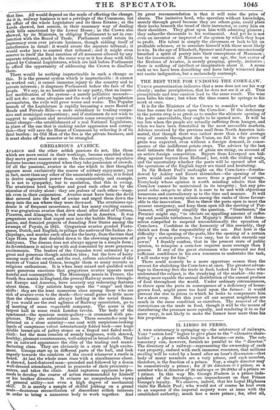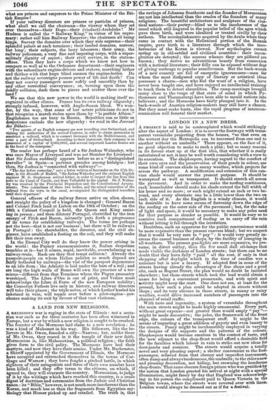IL LIBRO DI FERRO.
A NEW aristocracy is springing. up—the aristocracy of railways. Your "cotton lord" begins to give place to the" extensive share- holder " ; a phrase which implies a fortune—or ruin. The cot- tonocracy can, however, furnish no parallel to the " director." The directory of a railway—representing the ownership of such vast property, endued with such immense resources, that millions sterling will be voted by a board after an hour's discussion—that body of many members are a very prince, and each member, therefore, is the fraction of a prince. Nay, a single director may be cumulatively a prince; for if 20 directors ---,.- 1 prince, so a member who is director of 20 railways == 20-20ths of a prince = 1 prince. In this way Mr. George Hudson is a prince inde- pendent of the Sovereign,—no impeachment on that Prince George's loyalty. We observe, _indeed, that his Loyal Highness visits Sir Robert Peel ; who would not of course be host even to an emperor if the imperial majesty were at issue with the established authority, much less a mere prince ; for, after all, what are princes and emperors to the Prime Minister of the Bri- tish Empire ? If your railway direetors are princes or particles of princes, what shall we call the chairman—the viceroy whom they set over themselves—their Doge—their (viaduct)-Archduke ? Mr Hudson is called the "Railway King," in virtue of his supre- macy: rather call him Railway Emperor; the chairmen all tieing kings. Survey the domains over which they ride supreme—their splendid palace at each terminus ; their landed domains, narrow, but long; their subjects, the lusty: labourers ; their army, the railway policemen, a very fine and imposing corps, with a super_ military dignity of aspect ; their civil se/Tice, in the station- offices. Then they have a corps which we know not how to compare so well as to the Ordnance department—their engineers with the subordinate engine-drivers and stokers, marching hither and thither with that huge blind cannon the engine-boiler. Do not the railway sovereigns possess power of life and death? Can they not convey passengers more safely and smoothly than by any other terrestrial conveyance ; or, turning upon them the deadly collision, dash them to pieces and scatter them over the land ?
We see that this new power in the world is making itself re- cognized in other climes. France has its own railway oligarchy; strongly infused, however, with Anglo-Saxon blood. We won- der, by the way, that some of her astute politicians do not in that recognize a march stolen upon them by la perfide Albion." Englishmen too are busy in Russia. Republics can as little as despotisms exclude the new oligarchy : we read in the Journal des Debats-
" Two agents of an English company are now travelling over Switzerland, and visiting the authorities of the several Cantons, in order to obtain permission to construct a railroad, which is to connect Germany with the Mediterranean, and cross a part of Switzerland. According to their statement, their company is in possession of a capital of 3,000,0001., and several important London houses are at the head of the enterprise."
The reader has perhaps heard of a Sir Joshua Walmsley, who was once Mayor of Liverpool and was not Member for Liverpool : that Sir Joshua suddenly appears before us as a "distinguished traveller" in Spain—a parvenu grandee among hidalgos : but then Sir Joshua is "connected with railways"— "The day before yesterday," says a letter written at Santander on the 17th Oc- tober, in the Herald° of Madrid, Sir Joshua Walmsley and the eminent English engineer M. G. Stephenson arrived hither, in order to inspect the line from this town to the Canal of Castile, and from Valladolid to the capital. Sir J. Walms- ley was received by the Provincial Deputation and the Constitutional Ayunta- fluent°. Two committees of those two bodies, and the mixed committee of the railroad from the town to the canal, accompanied the distinguished travellers until their departure."
General officers of the railway forces arrive on alien shores, and straight the policy of a kingdom is changed : General Bacon and Colonel Fitch land at Lisbon on the 13th of October ; on the leth a Cabinet Council is held, the Queen and King assist- ing in person • and then dilatory Portugal, electrified by the iron energy of Fitch and Bacon, instantly puts forth a programme of its terms for establishing railways. The terms are perhaps not the best—that is not our business; but there will be railways in Portugal : the shareholder, the director, and the civil en- gineer, have established a footing on the soil, and they will make felt their iron sway. In the Eternal City well do they know the power arising in the world : the Papacy excommunicates it, Italian despotism trembles at it—but it comes, rapid, inevitable, overwhelming as a railway-train. Rash are they that tempt collision ! Already the passport-people on whom Italian policies so much depend are fairly bothered by railways—the vise of the passport degenerates to an idle form : the Adriatic is laid under the bars of a rail ; and ere long the high walls of Rome will own the presence of a ter- minus—different from that Terminus whom the Pagan peasantry worshiped. The Libro d'Oro is out of print, and Venice must acknowledge the Libro di Ferro of the new European nobility ; the Conscript Fathers live only in history, and railway, directors will take their places; the triple mitre, at which Luther hurled his inkstand in vain, will topple over before a pilot-engine—per- chance making its exit by favour of that vast viaticum.



























 Previous page
Previous page